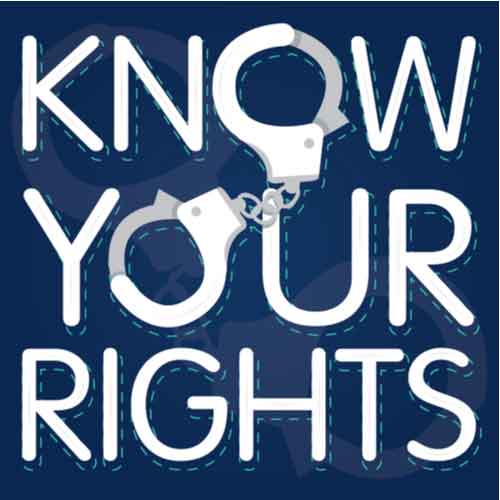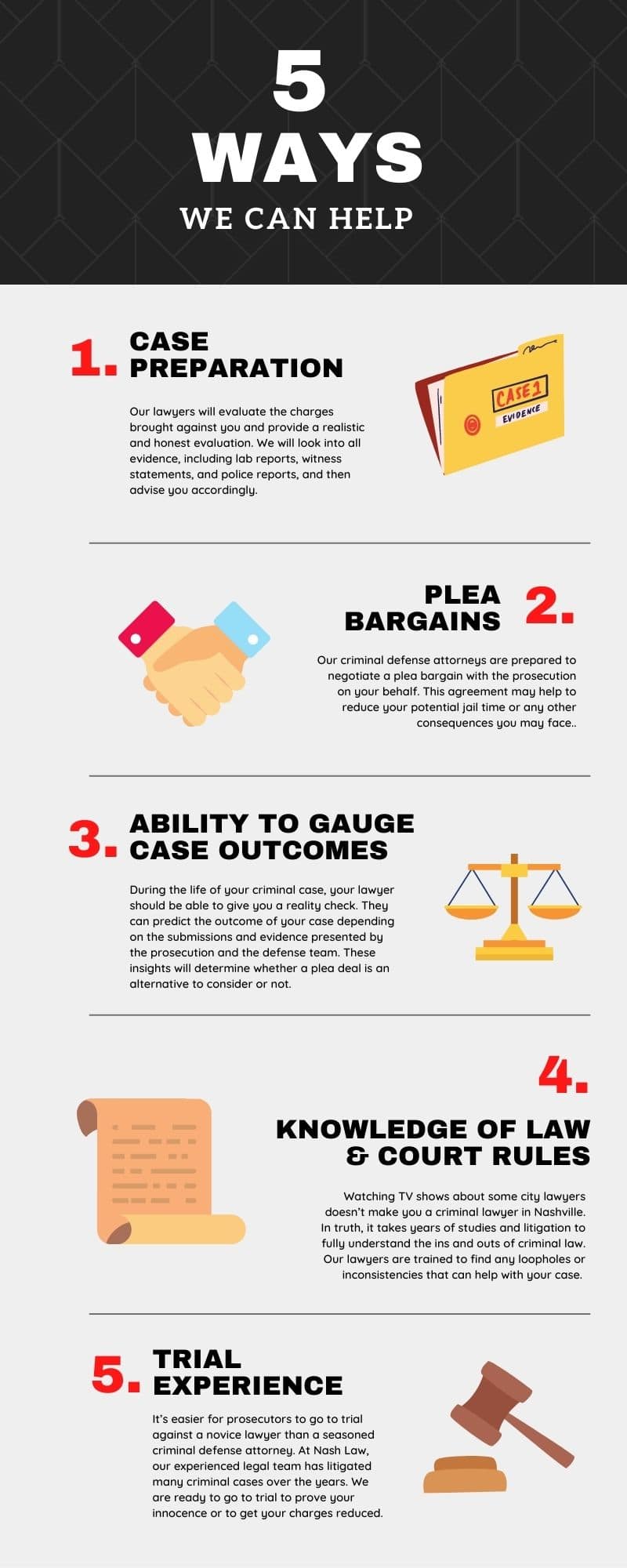A criminal conviction can have a long-lasting impact on your life. It can change the entire trajectory of your life. You may have to deal with severe legal ramifications once you are convicted in Tennessee. Still, a criminal conviction may have negative publicity on you and your loved ones.
If you have been charged with a crime in Nashville, Tennessee, you need the help of an experienced lawyer. You should not consult just any lawyer to help you with your criminal case. A seasoned and competent Nashville criminal defense attorney is who you need to hire for your criminal defense.
Our legal team is ready to counsel you throughout every step of the criminal justice process in Tennessee. Call 615-NASH-LAW now to schedule a free case evaluation and avoid being charged with a criminal offense. Our criminal defense law firm in Nashville, TN, will go above and beyond to build a strong defense and ensure you get a not guilty verdict. Get started now before it’s too late.
Table of Contents
What Are Your Rights as a Criminal Defendant in Nashville?
All US citizens have rights enshrined in the Bill of Rights. Regardless of whether you are accused of a criminal offense, you still have rights that law enforcement officers, the judiciary, and any other party must respect. A knowledgeable criminal defense lawyer in Nashville can help you understand your rights once you are arrested due to suspicion of a criminal offense.
Criminal defendants are offered basic protections under the Bill of Rights. These rights help defendants have a fair and just criminal justice process. If any of the defendant’s rights are breached, a seasoned Nashville criminal defense attorney can push for dismissal or mistrial of a criminal case.
Once you are arrested and charged with a crime in Tennessee, the following rights apply to you as a criminal defendant:
Fourth Amendment: Search and Seizure
This amendment protects criminal defendants from unreasonable searches and seizures. Law enforcement agencies and officers must have warrants to search a defendant’s property.
If the police obtain evidence without probable cause, this action is deemed illegal, and the evidence may not be admissible in Tennessee courts. The Fourth Amendment protects criminal defendants against searches by police officers without reasonable grounds.
The police must first obtain a warrant if they believe an individual is involved in a crime. A judge typically grants this warrant to allow the police to search a criminal defendant or their property for evidence. This amendment is meant to protect the privacy of criminal defendants.
Fifth Amendment: Self-Incrimination and Double Jeopardy
This amendment protects the rights of criminal defendants from abuse by the government or government agencies. As a criminal defendant, you have the right to remain silent. Police officers should not force you to answer their questions after an arrest. This also applies to prosecutors while your case is on trial.
According to the Fifth Amendment, a criminal defendant can’t “be compelled in any criminal case to be a witness against himself“. This gives the defendant the right to remain silent. This is what it means when accused persons “plead the fifth.”
The US Constitution also protects defendants from being tried twice for the same offense. This is known as the right against double jeopardy. For instance, the state of Tennessee cannot try a criminal defendant afresh for the same offense hoping to get a conviction. If the prosecution couldn’t prove your sexual assault offense during a trial, they cannot bring up the same case to court once again.
Sixth Amendment
The sixth amendment covers 4 key areas.
Right to Legal Representation
All criminal defendants have a right to seek legal counsel. If you have been charged with a criminal offense, you can hire a criminal defense lawyer in Nashville, TN. If you are unable to afford an attorney, a judge can appoint a public defender to help you with your criminal case. Still, a defendant has the right to decline legal counsel and opt to represent him or herself.
Right to a Speedy Trial
Defendants in Tennessee have the right to a quick public trial. This ensures the defendants don’t end up in jail for months as they await their trial date. It should be noted that the federal constitution of the US doesn’t specify the time limit that is or isn’t speedy.
Criminal defendants may also waive this right in cases where their criminal defense attorneys in Nashville require more time for case preparation.
Right to a Public Trial
The Sixth Amendment gives criminal defendants in Tennessee the right to be tried through a public trial by jurors. Here, the courtroom is accessible to the public and the press. Friends and family of the accused may attend trial hearings.
Right to Confront Witnesses
Criminal defendants have the right to confront witnesses or their accusers in the courtroom. They can cross-examine these parties to counter statements made against them. They also have the right to call witnesses to the stand to support their testimonies.
Eighth Amendment
The 8th amendment deals with bail and protection from cruel and unusual punishments.
Right to a Reasonable Bail Amount
This amendment allows the court to grant bail to the accused. Criminal defendants can pay bail to leave jail as they await trial. However, this doesn’t apply to all cases. According to the amendment, judges aren’t allowed to set an excessive bail that doesn’t resonate with the severity of one’s criminal offense.
Right From Unusual Punishment or Cruelty
The judgment one receives should be proportionate to the crime. For instance, a minor drug offense or a shoplifting crime doesn’t warrant the death penalty.
What Is a Misdemeanor Vs. a Felony in Tennessee?
There is a varying degree to everything. This concept is also true for criminal charges. For this reason, a person who slaps a waiter in a restaurant may not face the same charge as a person who shoots and injures the cashier in the same restaurant and walks away with all the cash in the register.
Still, you should never take any criminal charge lightly. Any type of criminal offense can have severe implications. An experienced criminal defense attorney near Nashville can help you avoid both misdemeanor and felony convictions.
A misdemeanor is a “lesser” crime than a felony. In Tennessee, this type of criminal offense is penalized by one year of jail time or less. It can also be punishable by a fine. This mainly depends on the severity and type of the crime committed.
Misdemeanors are categorized as either class A, B, or C misdemeanors. Class A misdemeanors carry a maximum sentence of 11 months and 29 days. They include domestic assault, driving under the influence, reckless endangerment, and theft under $1000.
Class B misdemeanors are punishable by a maximum sentence of 6 months. You may also be required to pay a fine of up to $500 for a class B misdemeanor. For class C misdemeanors, the maximum sentence is 30 days or a $50 fine. Public intoxication, trespassing, speeding, and disorderly conduct may be considered class C misdemeanors.
In the state of Tennessee, a felony is a crime punishable by more than one year in jail. The punishments for these crimes are usually harsher since they are considered more serious crimes. Apart from jail time, you also risk losing your right to vote, right to receive federal funding for your education, right to bear arms, professional license, and the privilege of working in most corporate companies.
Felonies in Tennessee are categorized as class A, B, C, D, and E. Class E is the least serious type of felony punishable by one to six years of jail time. Class A felonies are punishable by 15 to 60 years of jail time. Criminal defendants may also be convicted of capital crimes that are punishable by death or life imprisonment.
Some of the crimes that are considered felonies include:
- Robbery
- Drug trafficking
- Kidnapping
- Homicide or murder
- Rape
- Aggravated assault
- White-collar crimes
Should I Consult a Lawyer Before Speaking to the Police?
Yes. It is advisable to consult with a Nashville criminal defense lawyer before you say anything to the police. Remember, you have the right to remain silent. Police officers cannot force you to talk to them or answer their questions. You won’t face any legal problems by exercising your constitutional right to remain silent.
An experienced criminal defense lawyer from Nashville can ensure law enforcement officers don’t disregard your constitutional rights. The police will always try to get admissions, confessions, or any inconsistencies in your statements. At Nash Law, our legal team will ensure the police follow the right procedures and respect your rights as a suspect after your arrest.
What Is the Habitual Offender Law?
A habitual offender is someone who commits more than one offense. This is an individual who has been charged with a crime in the past and is facing fresh criminal charges. Habitual criminal offenders mostly commit the same or similar crimes to what they were previously charged with.
Repeat offenders often get harsher sentences for their crimes. The habitual offender law increases the severity of a repeat offender’s punishment. This law may also increase the requirements that one must fulfill during their parole or probation period.
At Nash Law, our criminal defense attorneys are ready to help you if you are facing habitual offender charges. Our legal team will thoroughly investigate your Nashville criminal case and advise you regarding your legal rights. We will explain how this law will affect your criminal case in Nashville, Tennessee.
Our attorneys will go above and beyond to come up with legal defenses that will do away with or reduce your criminal charges. Nash Law is also prepared to represent your interests in court.
How Can a Lawyer Help Me?
Once you are arrested and charged with a criminal offense in Nashville, TN, you may end up in prison and/or pay a fine for your offense. You will need to retain a competent criminal defense lawyer if you are facing any of the above prospects. Remember, all criminal cases differ.
Here’s how the legal team at Nash Law can help you:
Case Preparation
Our lawyers will evaluate the charges brought against you and provide a realistic and honest evaluation. We will look into all evidence, including lab reports, witness statements, and police reports, and then advise you accordingly.
Plea Bargains
Our criminal defense attorneys are prepared to negotiate a plea bargain with the prosecution on your behalf. This agreement may help to reduce your potential jail time or any other consequences you may face.
A top Nashville criminal defense attorney can even secure the dismissal of your case. When entering into a plea deal, Nash Law will consider:
- The evidence presented
- The seriousness of the alleged offense
- A guilty verdict prospect if the case goes to trial
Ability to Gauge Case Outcomes
During the life of your criminal case, your lawyer should be able to give you a reality check. They can predict the outcome of your case depending on the submissions and evidence presented by the prosecution and the defense team. These insights will determine whether a plea deal is an alternative to consider or not.
Knowledge of Law & Court Rules
Watching TV shows about some city lawyers doesn’t make you a criminal lawyer in Nashville. In truth, it takes years of studies and litigation to fully understand the ins and outs of criminal law. Our lawyers are trained to find any loopholes or inconsistencies that can help with your case.
For instance, we will be able to point out if the police wrongfully obtained evidence by searching your property without any probable cause.
Trial Experience
It’s easier for prosecutors to go to trial against a novice lawyer than a seasoned criminal defense attorney. At Nash Law, our experienced legal team has litigated many criminal cases over the years. We are ready to go to trial to prove your innocence or to get your charges reduced.
What Is the Cost of Legal Representation?
Many criminal defendants often wonder how much legal representation would cost. Legal fees for private counsel can either be fixed or hourly based. Various factors affect these legal fees, including the complexity of the criminal case and the lawyer’s experience.
For instance, most criminal defense law firms in Nashville charge higher legal fees for felonies than misdemeanors. Felonies are more complex cases that may require more work, and they also carry more severe penalties. Contingency fees typically don’t apply in criminal cases.
Is There a Benefit to Having a Private Attorney Vs. a Court-Appointed Attorney?
When facing criminal charges in Tennessee, you have the right to legal counsel. You can opt to hire a private attorney or work with a court-appointed attorney.
If you are unable to afford a lawyer in the state of Tennessee, the court may appoint a public defender to represent you in your case. However, this lawyer’s services may not be free in some cases. You may have to pay an appointed counsel fee once your case is closed.
Another risk of working with a court-appointed attorney is that they may be inexperienced and overworked. You may have to deal with freshly admitted attorneys who’ll use your criminal case to gain experience in the field. Still, a public defender may be handling lots of cases at once, making it hard to fully focus on your case.
By working with our criminal defense attorneys, you can rest assured that we will use all our resources to push for the best outcome in your case. What’s more, you get to work with an experienced and competent legal team, not just the next person on the list that’s assigned to defend you in court.
Can You Represent Yourself?
Self-representation is allowed in Tennessee. However, a judge will determine whether you are competent enough to represent yourself. The judge will consider factors such as your education, the seriousness of the crime, and whether you are aware you are giving up your right to legal counsel before making a determination.
Should I Accept a Plea Bargain?
Every criminal case is different. Accepting a plea bargain usually depends on the facts of the case. A plea deal may be great for one case but have dire consequences for another case. Remember, prosecutors and public defenders may at times urge you to take a plea deal, yet you have a strong case that you’d likely win in a trial.
If you’ve been offered a plea deal, reach out to a knowledgeable criminal defense lawyer in Nashville immediately for a detailed cost-benefit analysis of the deal.
What Are Some of the Reasons for Appealing a Conviction in Tennessee?
Many things can go wrong in a criminal trial. You may be convicted contrary to what you had hoped for. If you have been sentenced after a trial, you have the right to file an appeal. All criminal appeals are handled by the Tennessee Court of Criminal Appeals.
At Nash Law, our reliable team of lawyers will look into the facts of your case to identify errors and inconsistencies that can help your appeal.
They may include:
- Evidence being left out of the trial by the prosecution
- Evidence that the prosecution shouldn’t have used
- Sentencing for the wrong crime
- Application of the wrong doctrines
- Confusing instructions to the jury
Reach Out to Our Nashville Criminal Defense Attorneys Today for a Free Case Evaluation
The criminal justice process can be overwhelming. With the help of an experienced lawyer, you can navigate your criminal case and get a favorable outcome. At Nash Law, our legal team is ready to help you clear your name and regain your life back.
Contact us now to book your free case evaluation. Our lawyers are ready to provide the guidance and support you require during this trying time. Let us help you avoid conviction or a hefty fine. Get started now before it’s too late.





